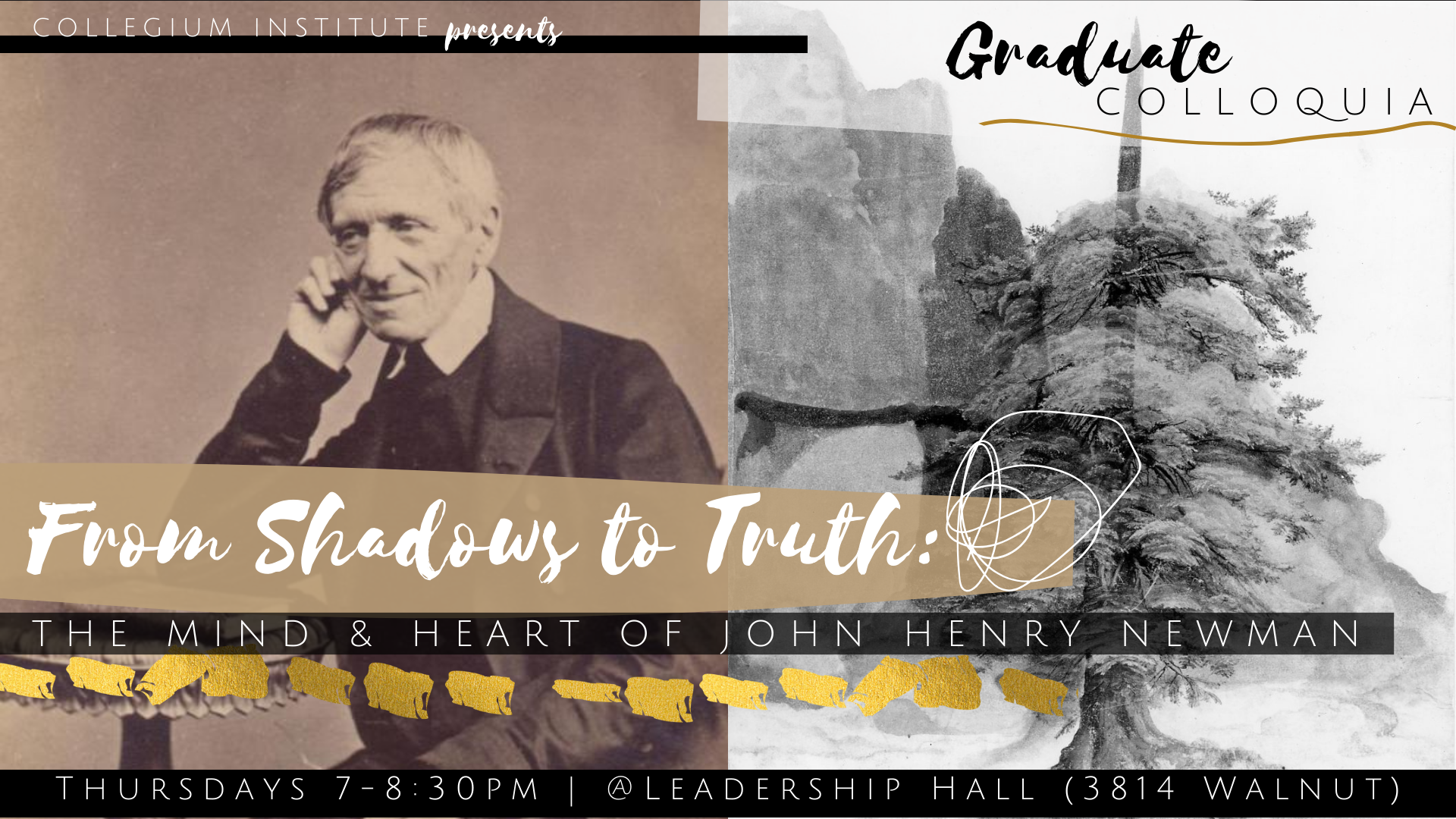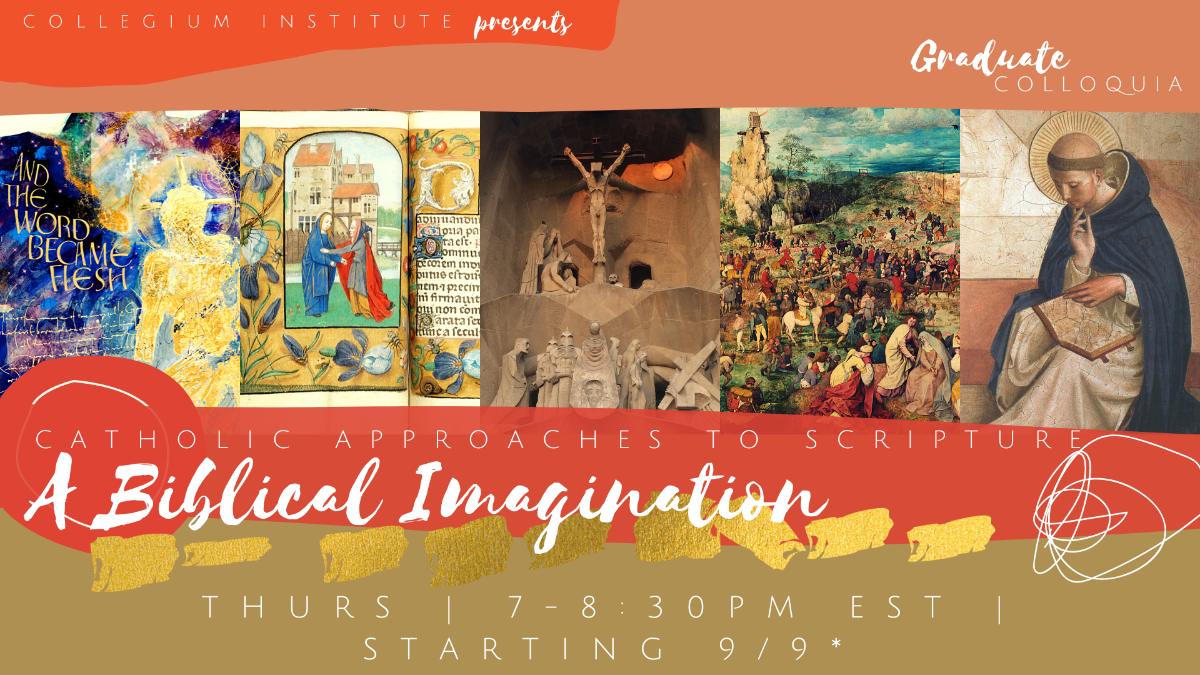
GradFellows Colloquia
The Graduate Fellows Program was founded in 2013 by graduate and professional students throughout the University of Pennsylvania, all of whom were united by an interest in bringing their respective disciplines into dialogue with the humanistic and Christian intellectual traditions. The principal features of the program are outlined below.
A community of graduate and professional students who join together monthly for lively conversation and the pursuit of wisdom and truth.
The Pillars of the Graduate Fellows Program
1. Monthly Reading Colloquia
In the spirit of the Catholic intellectual tradition, the monthly reading colloquia cultivate an ongoing conversation about the Christian tradition and modern scholarship at Penn. They present opportunities for graduate students to delve together into foundational, canonical texts, which in turn are harmonized with various disciplines of the modern academy in order to facilitate a fellow’s deeper engagement with them. Graduate Fellows will have opportunities to facilitate one colloquium per year and are invited to other colloquia and lectures.
These monthly sessions are open to all graduate students.
2. Specialized Reading Groups
Graduate Fellows are invited to join specialized reading groups—or create their own—in addition to our monthly colloquia. These reading groups meet in a smaller setting to examine specific academic traditions more systematically. The first such group launched in January 2018 is Theory & Theology, reviewing Foucault, Barthes, Derrida and others together with paired theological texts. This past Spring of 2020, a reading group explored Liberation Theology and its Responses.
4. Intellectual Community
The Graduate Fellows Program also fosters a vibrant intellectual community for Graduate students in the wider Philadelphia area. Along with the Colloquia, there are often opportunities for fellowship, including post-discussion Happy Hours where the conversation continues. The Program also provides opportunities for private dinners with visiting scholars and speakers.
3. Research and Travel Grants
Each Graduate Fellow is eligible to apply for a limited number of travel and research grants available each year, and awardees will be determined by a Collegium faculty selection committee. These grants will range from $250 to $1,000 for projects that advance the mission of the Collegium Institute in a productive and compelling way. There will be a limited number of these grants available each year. In order to apply, please send a proposal of up to 750 words that addresses the criteria above, plus your CV to our coordinator, Jessica Sweeney at jferro@sas.upenn.edu.
2023-2024 Colloquia
2023-24, From Shadows to Truth: The Mind and Heart of John Henry Newman
This year, the Grad Fellows Colloquium will explore the thought of the recently canonized Saint John Henry Newman. An expansive thinker whose mind comprehended and advanced such disparate branches of knowledge as history, literature, education, philosophy, and theology as converging on one true center, Newman generously bequeathed to posterity the fruits of his unusually fertile mind in thirty-one volumes composed in what James Joyce considered the greatest English prose style ever written.
Rather than attempting to read the entirety of Newman’s corpus, this Colloquium will expose graduate students to the breadth of his thought through representative excerpts illustrating his deeply original contributions to education, philosophy, theology, and poetry. By the end of this Colloquium, we hope students will gain a greater appreciation not only of Newman’s mind, but of his heart as well. To paraphrase the great convert and cardinal, our aim is for Newman’s heart to speak to our hearts, and allow Newman’s person to influence us, his voice to melt us, his look to subdue us, and his deeds to inflame us.
Click the button below to learn more.
Past Colloquia Themes
2022-23, Exploring Conciliar Theology: From Trent to Vatican II
In this year’s grad colloquium, we will engage with the two great councils of the modern world: Trent and Vatican II. We will consider these two formative councils for the modern world and explore them as essential guides for understanding our salvation and justification, the nature of the human person, the meaning of the church church, the shape of the lay vocation, and the relationship between religion and freedom.
In exploring these two councils, we hope to deepen our understanding of Catholicism while considering ways to bring the faith to the world.
Click the button below to learn more.
2021-2022: Catholic Approaches to Scripture: A Biblical Imagination
“Ignorance of Scripture is ignorance of Christ.
–St. Jerome
In this year’s Collegium Graduate Colloquia, we explored the polyphony of complementary approaches to Sacred Scripture in the Catholic tradition. This included understanding different ways of interpreting the Bible within the Catholic intellectual tradition, past and present, but also ways of encountering Holy Writ through art, text, music, liturgy, and literature, all of which are to be directed toward the love of God.
2020-2021, Modern Catholic Literature
In the 2020-2021 AY Grad Fellows Colloquia, we looked at Catholic literature in the modern world. The goal was to explore some themes related to questions about the arts, Catholic imagination, depictions of sin and grace, and narrative or poetic ways of doing theology. We read a variety of short stories, essays, and poems by Catholic authors.
The Schedule for the year:
Sept. Flannery O’Connor: A Canonical presentation of Catholic Literature
Oct. Non-Western Catholic Literature: Finding Christ in Endo’s Japan
Nov. Beyond Narrative. Poetic Expressions of Catholic Literature: Gerard M. Hopkins, Claude McKay, Denise Levertov, Mary Karr, Elizabeth Acevedo
Jan. The Catholic Novel: Graham Greene’s The Power and the Glory
Feb. Latin American Experience and the Essay as Art Form, excerpts from Richard Rodriguez’s Darling
Mar. The French Context: Charles Peguy and Simone Weil
Apr. Catholic Literature as Theology: T.S. Eliot’s The Four Quartets May. Comic Relief: Walker Percy, G.K. Chesterton, & Flannery O’Connor
2019-2020, Catholic Social Thought
In the 2019-2020 GradFellows Colloquia, we dove into the deep tradition of Catholic Social Thought. Beginning with the Leonine Tradition and moving out from there topically and textually. Graduate students and faculty gathered for a survey on this essential tradition, covering topics from solidarity and peace to religious freedom and environmental ethics. We kicked off the year with a special Happy Hour for Grad Fellows on Friday, September 6th, 2019.
The Schedule for the year:
Sept. The Leonine Tradition and Catholic Social Theory, with Dr. John Buchmann
Oct. Pacem in Terris and the New Political Order, with Prof. Sally Scholz
Nov. Dignitatis Humanae and the Question of Religious Freedom, with Dr. Margaret Hogan
Jan. Populorum Progressio and a New Christian Humanism, with Giles Dimock, OP, and Timothy Danaher, OP
Feb. John Paul II and the Consistent Ethic of Life, with Prof. Gerald Beyer (Villanova University)
Mar. Caritas in Veritate and the Spirit of Gift, with Terence Sweeney (Villanova University)
Apr. Laudato Si’ and the Environment, with Dr. Isabel Perera, Dr. Daniel Cheely, Fr. Danaher
2018-2019, Nouvelle Theologie
In the 2018-2019 academic yearGrad Fellows explored key themes in The Nouvelle Théologie, which received its name from Garrigou-Lagrange’s words of harsh censure. In the neo Scholastic mind, “new” meant “bad.” Nevertheless, the theology of Yves Congar, Henri de Lubac, Hans Urs von Balthasar and others transformed theology by returning to the sources of Scripture and the Church Fathers, and paved the way for the Second Vatican Council. Graduate students joined us for an introduction to this pivotal movement in the history of theology and the Church covering topics like the nature of the Church, the relationship between nature and grace and the roles of reason and revelation.













